OLIO: An In-depth Report on Entrepreneurship, Values, and Commerce
VerifiedAdded on 2023/01/11
|6
|1467
|40
Report
AI Summary
This report provides an analysis of OLIO, a food-sharing application and organization founded by Tessa Clarke and Saasha Celestial-One in 2015. The report examines OLIO's entrepreneurial aspects, including its leadership style, effective management, and the use of skills and abilities. It explores the company's success, highlighting its fundraising achievements and operational strategies. The report also discusses the values and benefits OLIO provides to the local economy, such as reducing food waste and motivating others to save resources. Furthermore, it assesses OLIO's value and impact within the broader context of commerce, including its relationships with major supermarkets. The report concludes that OLIO's success is a result of effective entrepreneurship, offering significant benefits to the economy and society. The report cites various books and journals to support the analysis.

Assessment
Paraphrase This Document
Need a fresh take? Get an instant paraphrase of this document with our AI Paraphraser
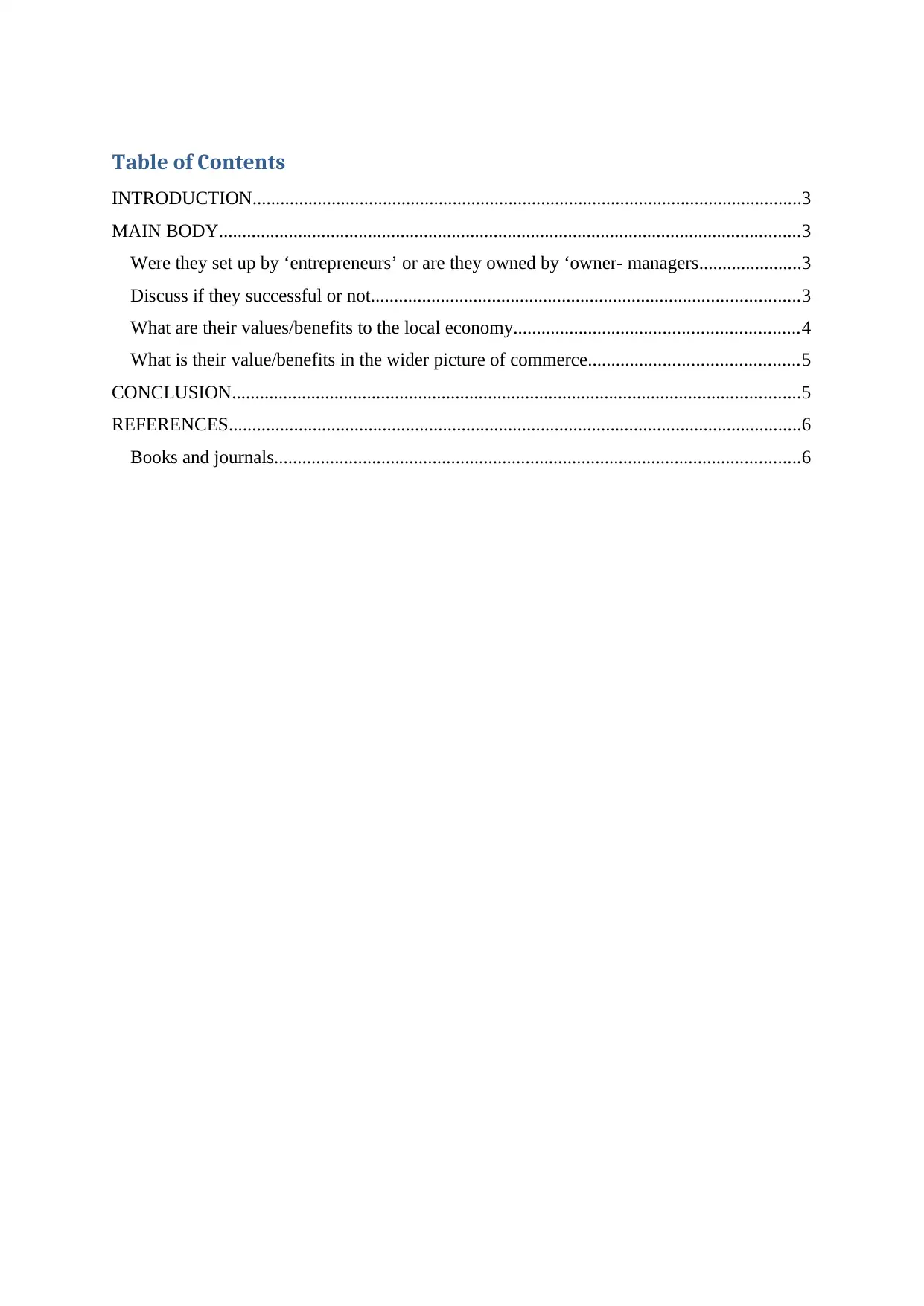
Table of Contents
INTRODUCTION......................................................................................................................3
MAIN BODY.............................................................................................................................3
Were they set up by ‘entrepreneurs’ or are they owned by ‘owner- managers......................3
Discuss if they successful or not............................................................................................3
What are their values/benefits to the local economy.............................................................4
What is their value/benefits in the wider picture of commerce.............................................5
CONCLUSION..........................................................................................................................5
REFERENCES...........................................................................................................................6
Books and journals.................................................................................................................6
INTRODUCTION......................................................................................................................3
MAIN BODY.............................................................................................................................3
Were they set up by ‘entrepreneurs’ or are they owned by ‘owner- managers......................3
Discuss if they successful or not............................................................................................3
What are their values/benefits to the local economy.............................................................4
What is their value/benefits in the wider picture of commerce.............................................5
CONCLUSION..........................................................................................................................5
REFERENCES...........................................................................................................................6
Books and journals.................................................................................................................6
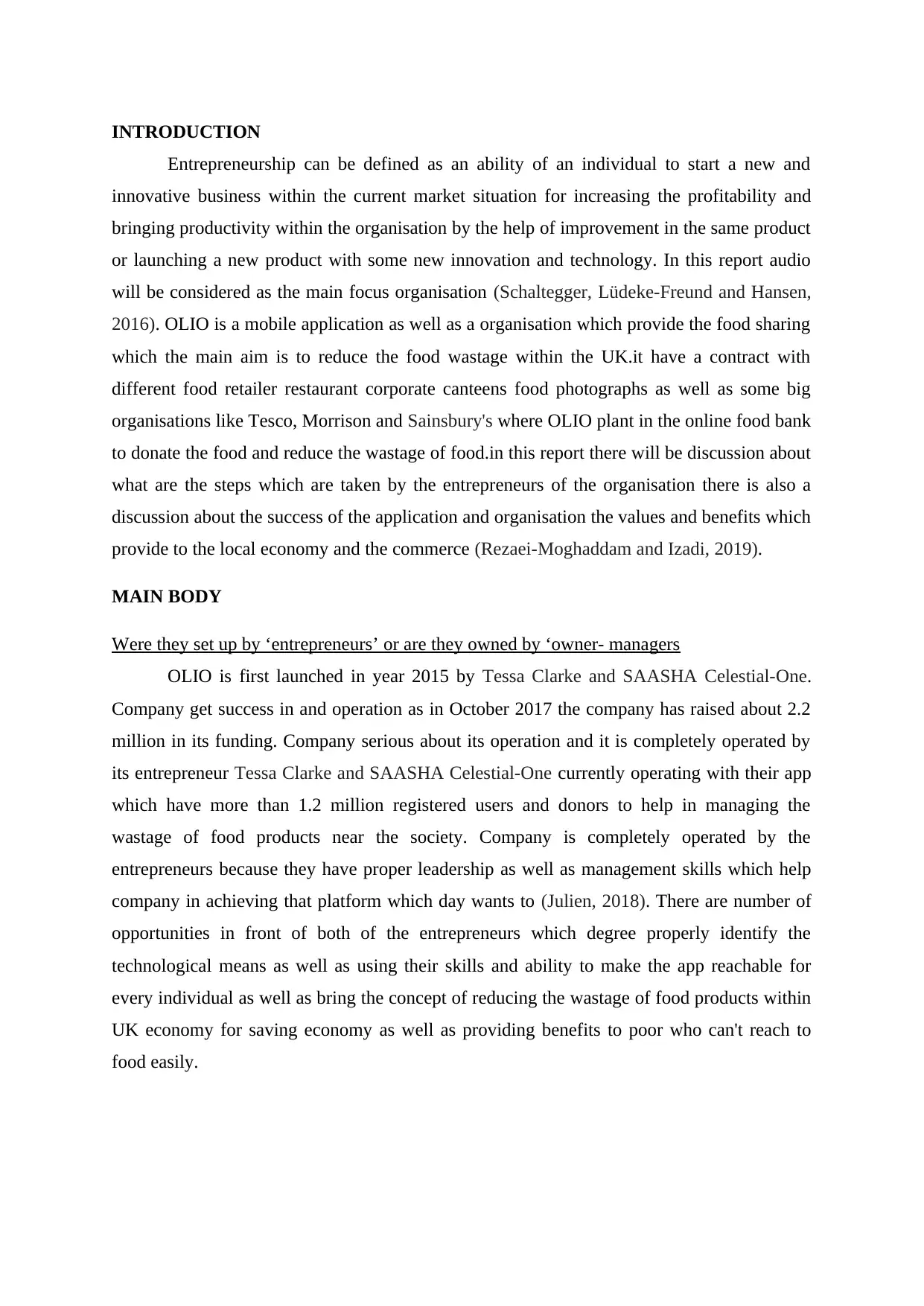
INTRODUCTION
Entrepreneurship can be defined as an ability of an individual to start a new and
innovative business within the current market situation for increasing the profitability and
bringing productivity within the organisation by the help of improvement in the same product
or launching a new product with some new innovation and technology. In this report audio
will be considered as the main focus organisation (Schaltegger, Lüdeke-Freund and Hansen,
2016). OLIO is a mobile application as well as a organisation which provide the food sharing
which the main aim is to reduce the food wastage within the UK.it have a contract with
different food retailer restaurant corporate canteens food photographs as well as some big
organisations like Tesco, Morrison and Sainsbury's where OLIO plant in the online food bank
to donate the food and reduce the wastage of food.in this report there will be discussion about
what are the steps which are taken by the entrepreneurs of the organisation there is also a
discussion about the success of the application and organisation the values and benefits which
provide to the local economy and the commerce (Rezaei-Moghaddam and Izadi, 2019).
MAIN BODY
Were they set up by ‘entrepreneurs’ or are they owned by ‘owner- managers
OLIO is first launched in year 2015 by Tessa Clarke and SAASHA Celestial-One.
Company get success in and operation as in October 2017 the company has raised about 2.2
million in its funding. Company serious about its operation and it is completely operated by
its entrepreneur Tessa Clarke and SAASHA Celestial-One currently operating with their app
which have more than 1.2 million registered users and donors to help in managing the
wastage of food products near the society. Company is completely operated by the
entrepreneurs because they have proper leadership as well as management skills which help
company in achieving that platform which day wants to (Julien, 2018). There are number of
opportunities in front of both of the entrepreneurs which degree properly identify the
technological means as well as using their skills and ability to make the app reachable for
every individual as well as bring the concept of reducing the wastage of food products within
UK economy for saving economy as well as providing benefits to poor who can't reach to
food easily.
Entrepreneurship can be defined as an ability of an individual to start a new and
innovative business within the current market situation for increasing the profitability and
bringing productivity within the organisation by the help of improvement in the same product
or launching a new product with some new innovation and technology. In this report audio
will be considered as the main focus organisation (Schaltegger, Lüdeke-Freund and Hansen,
2016). OLIO is a mobile application as well as a organisation which provide the food sharing
which the main aim is to reduce the food wastage within the UK.it have a contract with
different food retailer restaurant corporate canteens food photographs as well as some big
organisations like Tesco, Morrison and Sainsbury's where OLIO plant in the online food bank
to donate the food and reduce the wastage of food.in this report there will be discussion about
what are the steps which are taken by the entrepreneurs of the organisation there is also a
discussion about the success of the application and organisation the values and benefits which
provide to the local economy and the commerce (Rezaei-Moghaddam and Izadi, 2019).
MAIN BODY
Were they set up by ‘entrepreneurs’ or are they owned by ‘owner- managers
OLIO is first launched in year 2015 by Tessa Clarke and SAASHA Celestial-One.
Company get success in and operation as in October 2017 the company has raised about 2.2
million in its funding. Company serious about its operation and it is completely operated by
its entrepreneur Tessa Clarke and SAASHA Celestial-One currently operating with their app
which have more than 1.2 million registered users and donors to help in managing the
wastage of food products near the society. Company is completely operated by the
entrepreneurs because they have proper leadership as well as management skills which help
company in achieving that platform which day wants to (Julien, 2018). There are number of
opportunities in front of both of the entrepreneurs which degree properly identify the
technological means as well as using their skills and ability to make the app reachable for
every individual as well as bring the concept of reducing the wastage of food products within
UK economy for saving economy as well as providing benefits to poor who can't reach to
food easily.
⊘ This is a preview!⊘
Do you want full access?
Subscribe today to unlock all pages.

Trusted by 1+ million students worldwide
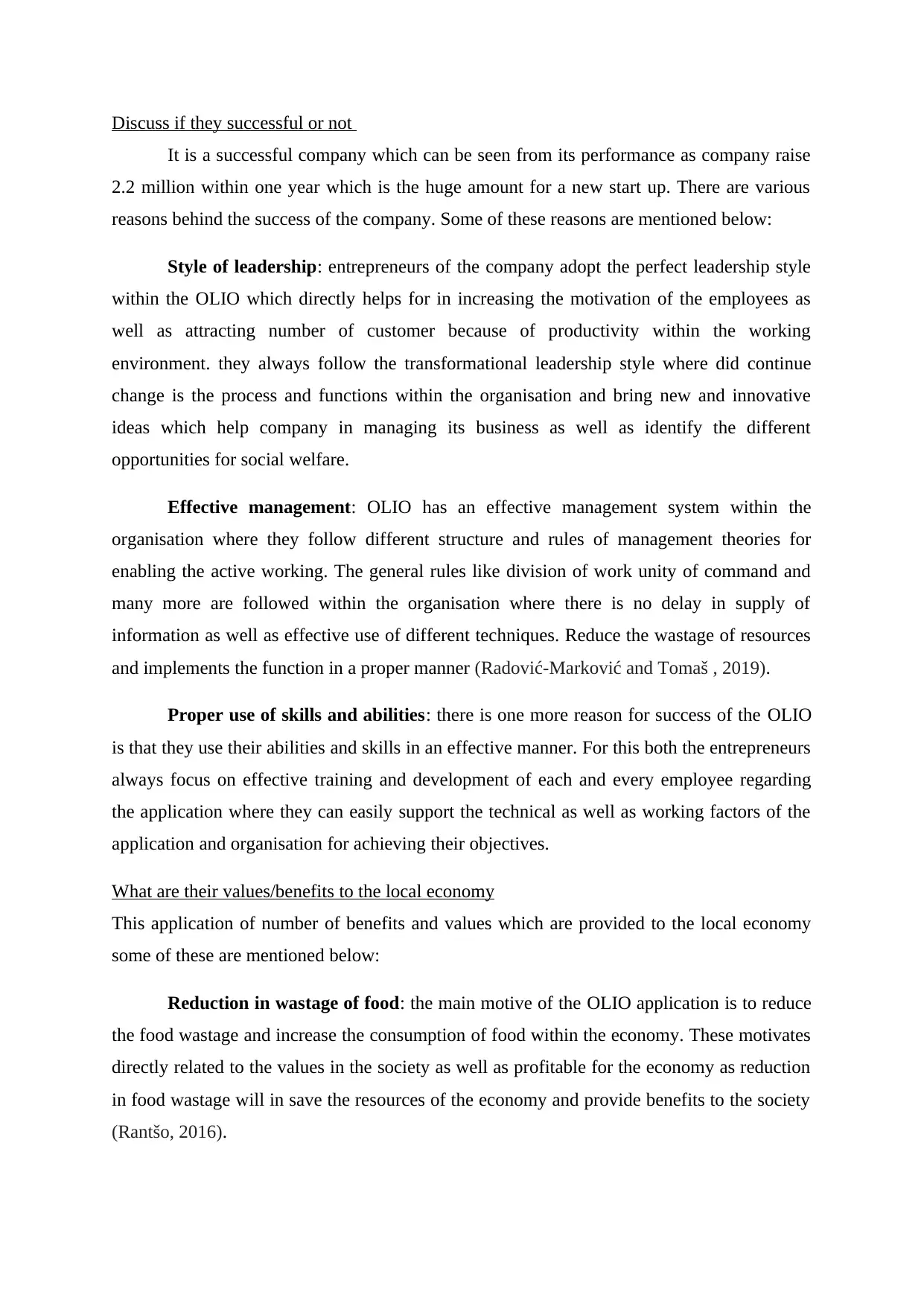
Discuss if they successful or not
It is a successful company which can be seen from its performance as company raise
2.2 million within one year which is the huge amount for a new start up. There are various
reasons behind the success of the company. Some of these reasons are mentioned below:
Style of leadership: entrepreneurs of the company adopt the perfect leadership style
within the OLIO which directly helps for in increasing the motivation of the employees as
well as attracting number of customer because of productivity within the working
environment. they always follow the transformational leadership style where did continue
change is the process and functions within the organisation and bring new and innovative
ideas which help company in managing its business as well as identify the different
opportunities for social welfare.
Effective management: OLIO has an effective management system within the
organisation where they follow different structure and rules of management theories for
enabling the active working. The general rules like division of work unity of command and
many more are followed within the organisation where there is no delay in supply of
information as well as effective use of different techniques. Reduce the wastage of resources
and implements the function in a proper manner (Radović-Marković and Tomaš , 2019).
Proper use of skills and abilities: there is one more reason for success of the OLIO
is that they use their abilities and skills in an effective manner. For this both the entrepreneurs
always focus on effective training and development of each and every employee regarding
the application where they can easily support the technical as well as working factors of the
application and organisation for achieving their objectives.
What are their values/benefits to the local economy
This application of number of benefits and values which are provided to the local economy
some of these are mentioned below:
Reduction in wastage of food: the main motive of the OLIO application is to reduce
the food wastage and increase the consumption of food within the economy. These motivates
directly related to the values in the society as well as profitable for the economy as reduction
in food wastage will in save the resources of the economy and provide benefits to the society
(Rantšo, 2016).
It is a successful company which can be seen from its performance as company raise
2.2 million within one year which is the huge amount for a new start up. There are various
reasons behind the success of the company. Some of these reasons are mentioned below:
Style of leadership: entrepreneurs of the company adopt the perfect leadership style
within the OLIO which directly helps for in increasing the motivation of the employees as
well as attracting number of customer because of productivity within the working
environment. they always follow the transformational leadership style where did continue
change is the process and functions within the organisation and bring new and innovative
ideas which help company in managing its business as well as identify the different
opportunities for social welfare.
Effective management: OLIO has an effective management system within the
organisation where they follow different structure and rules of management theories for
enabling the active working. The general rules like division of work unity of command and
many more are followed within the organisation where there is no delay in supply of
information as well as effective use of different techniques. Reduce the wastage of resources
and implements the function in a proper manner (Radović-Marković and Tomaš , 2019).
Proper use of skills and abilities: there is one more reason for success of the OLIO
is that they use their abilities and skills in an effective manner. For this both the entrepreneurs
always focus on effective training and development of each and every employee regarding
the application where they can easily support the technical as well as working factors of the
application and organisation for achieving their objectives.
What are their values/benefits to the local economy
This application of number of benefits and values which are provided to the local economy
some of these are mentioned below:
Reduction in wastage of food: the main motive of the OLIO application is to reduce
the food wastage and increase the consumption of food within the economy. These motivates
directly related to the values in the society as well as profitable for the economy as reduction
in food wastage will in save the resources of the economy and provide benefits to the society
(Rantšo, 2016).
Paraphrase This Document
Need a fresh take? Get an instant paraphrase of this document with our AI Paraphraser
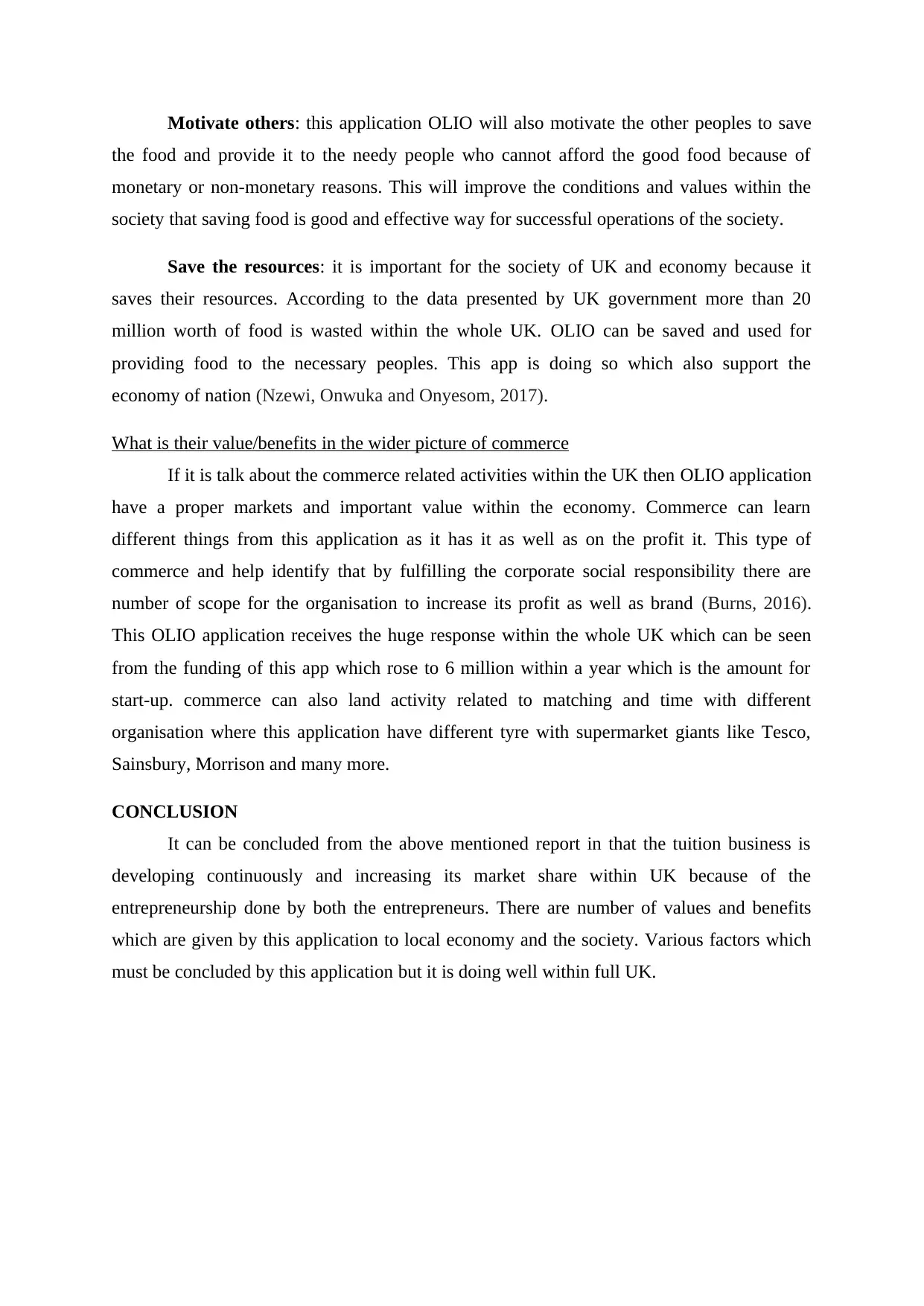
Motivate others: this application OLIO will also motivate the other peoples to save
the food and provide it to the needy people who cannot afford the good food because of
monetary or non-monetary reasons. This will improve the conditions and values within the
society that saving food is good and effective way for successful operations of the society.
Save the resources: it is important for the society of UK and economy because it
saves their resources. According to the data presented by UK government more than 20
million worth of food is wasted within the whole UK. OLIO can be saved and used for
providing food to the necessary peoples. This app is doing so which also support the
economy of nation (Nzewi, Onwuka and Onyesom, 2017).
What is their value/benefits in the wider picture of commerce
If it is talk about the commerce related activities within the UK then OLIO application
have a proper markets and important value within the economy. Commerce can learn
different things from this application as it has it as well as on the profit it. This type of
commerce and help identify that by fulfilling the corporate social responsibility there are
number of scope for the organisation to increase its profit as well as brand (Burns, 2016).
This OLIO application receives the huge response within the whole UK which can be seen
from the funding of this app which rose to 6 million within a year which is the amount for
start-up. commerce can also land activity related to matching and time with different
organisation where this application have different tyre with supermarket giants like Tesco,
Sainsbury, Morrison and many more.
CONCLUSION
It can be concluded from the above mentioned report in that the tuition business is
developing continuously and increasing its market share within UK because of the
entrepreneurship done by both the entrepreneurs. There are number of values and benefits
which are given by this application to local economy and the society. Various factors which
must be concluded by this application but it is doing well within full UK.
the food and provide it to the needy people who cannot afford the good food because of
monetary or non-monetary reasons. This will improve the conditions and values within the
society that saving food is good and effective way for successful operations of the society.
Save the resources: it is important for the society of UK and economy because it
saves their resources. According to the data presented by UK government more than 20
million worth of food is wasted within the whole UK. OLIO can be saved and used for
providing food to the necessary peoples. This app is doing so which also support the
economy of nation (Nzewi, Onwuka and Onyesom, 2017).
What is their value/benefits in the wider picture of commerce
If it is talk about the commerce related activities within the UK then OLIO application
have a proper markets and important value within the economy. Commerce can learn
different things from this application as it has it as well as on the profit it. This type of
commerce and help identify that by fulfilling the corporate social responsibility there are
number of scope for the organisation to increase its profit as well as brand (Burns, 2016).
This OLIO application receives the huge response within the whole UK which can be seen
from the funding of this app which rose to 6 million within a year which is the amount for
start-up. commerce can also land activity related to matching and time with different
organisation where this application have different tyre with supermarket giants like Tesco,
Sainsbury, Morrison and many more.
CONCLUSION
It can be concluded from the above mentioned report in that the tuition business is
developing continuously and increasing its market share within UK because of the
entrepreneurship done by both the entrepreneurs. There are number of values and benefits
which are given by this application to local economy and the society. Various factors which
must be concluded by this application but it is doing well within full UK.
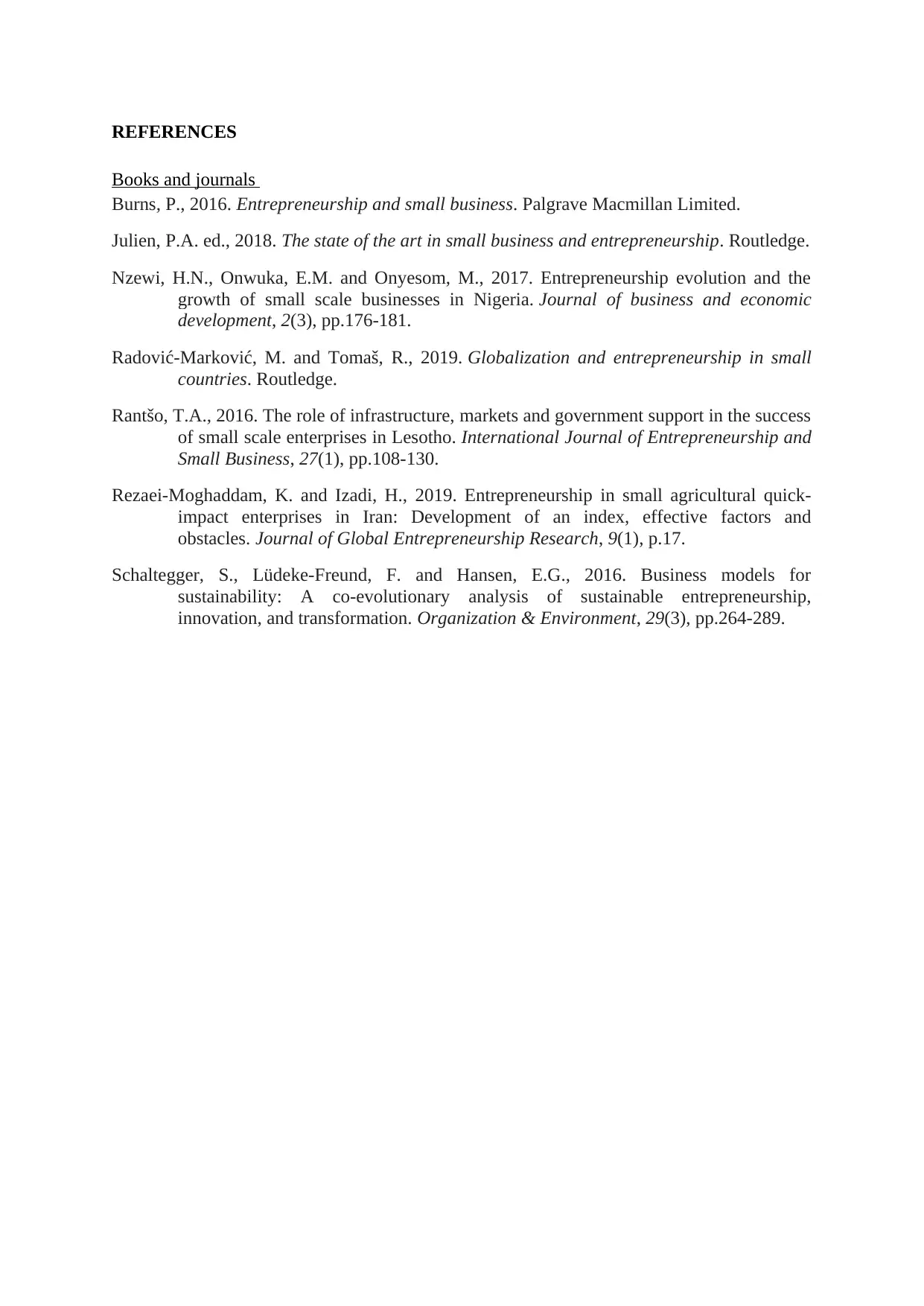
REFERENCES
Books and journals
Burns, P., 2016. Entrepreneurship and small business. Palgrave Macmillan Limited.
Julien, P.A. ed., 2018. The state of the art in small business and entrepreneurship. Routledge.
Nzewi, H.N., Onwuka, E.M. and Onyesom, M., 2017. Entrepreneurship evolution and the
growth of small scale businesses in Nigeria. Journal of business and economic
development, 2(3), pp.176-181.
Radović-Marković, M. and Tomaš, R., 2019. Globalization and entrepreneurship in small
countries. Routledge.
Rantšo, T.A., 2016. The role of infrastructure, markets and government support in the success
of small scale enterprises in Lesotho. International Journal of Entrepreneurship and
Small Business, 27(1), pp.108-130.
Rezaei-Moghaddam, K. and Izadi, H., 2019. Entrepreneurship in small agricultural quick-
impact enterprises in Iran: Development of an index, effective factors and
obstacles. Journal of Global Entrepreneurship Research, 9(1), p.17.
Schaltegger, S., Lüdeke-Freund, F. and Hansen, E.G., 2016. Business models for
sustainability: A co-evolutionary analysis of sustainable entrepreneurship,
innovation, and transformation. Organization & Environment, 29(3), pp.264-289.
Books and journals
Burns, P., 2016. Entrepreneurship and small business. Palgrave Macmillan Limited.
Julien, P.A. ed., 2018. The state of the art in small business and entrepreneurship. Routledge.
Nzewi, H.N., Onwuka, E.M. and Onyesom, M., 2017. Entrepreneurship evolution and the
growth of small scale businesses in Nigeria. Journal of business and economic
development, 2(3), pp.176-181.
Radović-Marković, M. and Tomaš, R., 2019. Globalization and entrepreneurship in small
countries. Routledge.
Rantšo, T.A., 2016. The role of infrastructure, markets and government support in the success
of small scale enterprises in Lesotho. International Journal of Entrepreneurship and
Small Business, 27(1), pp.108-130.
Rezaei-Moghaddam, K. and Izadi, H., 2019. Entrepreneurship in small agricultural quick-
impact enterprises in Iran: Development of an index, effective factors and
obstacles. Journal of Global Entrepreneurship Research, 9(1), p.17.
Schaltegger, S., Lüdeke-Freund, F. and Hansen, E.G., 2016. Business models for
sustainability: A co-evolutionary analysis of sustainable entrepreneurship,
innovation, and transformation. Organization & Environment, 29(3), pp.264-289.
⊘ This is a preview!⊘
Do you want full access?
Subscribe today to unlock all pages.

Trusted by 1+ million students worldwide
1 out of 6
Related Documents
Your All-in-One AI-Powered Toolkit for Academic Success.
+13062052269
info@desklib.com
Available 24*7 on WhatsApp / Email
![[object Object]](/_next/static/media/star-bottom.7253800d.svg)
Unlock your academic potential
Copyright © 2020–2026 A2Z Services. All Rights Reserved. Developed and managed by ZUCOL.





